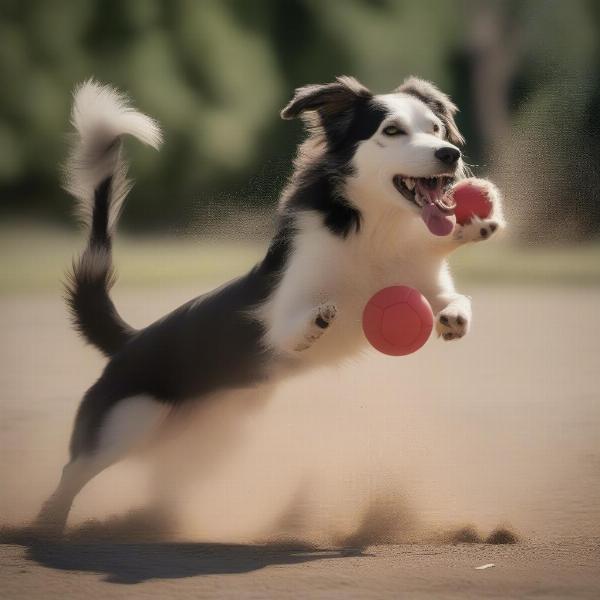The term “pot dog” is often used colloquially, sometimes with negative connotations, to describe a dog that appears short and stout, resembling the shape of a pot. While there’s no officially recognized breed called a “pot dog,” the term typically refers to mixed breeds or dogs with certain physical characteristics like short legs and a stocky build. Understanding what people mean by “pot dog” helps us address the needs of these charming companions and dispel any misconceptions surrounding the term.
Many breeds, or mixes thereof, might be considered “pot dogs.” These can include Corgis, Dachshunds, Basset Hounds, English Bulldogs, and French Bulldogs. These breeds are often chosen for their compact size and affectionate personalities, making them ideal companions for apartment living or families with limited space. It’s crucial to remember that the term “pot dog” shouldn’t be used to generalize these breeds, as each possesses unique traits and characteristics.
Choosing a “Pot Dog” Breed or Mix
If you’re considering welcoming a “pot dog” into your life, research is key. While the adorable appearance is undoubtedly appealing, understanding the specific needs of breeds commonly associated with this term is crucial. For instance, Dachshunds, with their elongated backs, are prone to back problems, while Bulldogs can suffer from breathing difficulties due to their brachycephalic features. Choosing a reputable breeder who prioritizes the health and well-being of their dogs can minimize these risks. If adopting a mixed breed, understanding the potential health concerns associated with the parent breeds can help you provide the best possible care.
Health and Care for Your “Pot Dog”
Regardless of breed or mix, providing proper care for your “pot dog” is essential. A balanced diet is crucial to maintain a healthy weight, as obesity can exacerbate existing health issues. Regular exercise is also important, but it’s crucial to tailor the activity level to your dog’s breed and physical condition. Low-impact activities like swimming or short walks are often preferable to strenuous exercise, especially for breeds prone to joint problems.
Training and Socialization for “Pot Dogs”
Like all dogs, “pot dogs” benefit from early socialization and training. Positive reinforcement methods are generally most effective, focusing on rewarding desired behaviors rather than punishing unwanted ones. Early socialization helps your “pot dog” develop into a well-adjusted and confident companion. idaho sled dog challenge This includes exposing them to various sights, sounds, people, and other animals in a safe and controlled environment.
Addressing Misconceptions about “Pot Dogs”
It’s important to address the potential negative connotations associated with the term “pot dog.” The term can sometimes be used dismissively or to imply that these dogs are less active or capable than other breeds. This is simply not true. “Pot dogs” can be just as energetic, playful, and intelligent as any other dog. husky dog breeders ontario The focus should always be on providing appropriate care and enrichment based on the individual dog’s needs, regardless of their physical appearance.
Conclusion
Understanding the nuances of the term “pot dog” empowers us to make informed decisions about choosing and caring for these delightful companions. By focusing on the individual dog’s needs, we can ensure a happy and healthy life for our “pot dog” friends. cod skin dog treats Remember, responsible ownership involves research, proper care, and a commitment to providing a loving and enriching environment.
FAQ
- What exactly is a “pot dog”? The term “pot dog” usually describes a dog with a short, stout build, resembling a pot. It’s not a specific breed but rather a descriptive term.
- Are “pot dogs” healthy? Like all dogs, “pot dogs” can be prone to certain health issues depending on their breed or mix. Regular veterinary care and a healthy lifestyle are crucial.
- What are some common “pot dog” breeds? Breeds often associated with the term include Corgis, Dachshunds, Basset Hounds, and Bulldogs.
- Do “pot dogs” need a lot of exercise? Exercise needs vary depending on the breed and individual dog. While regular activity is important, it should be tailored to their physical capabilities.
- Are “pot dogs” good family pets? Many “pot dog” breeds are known for their affectionate and loyal personalities, making them wonderful companions for families. dog breeders in new brunswick canada However, it’s crucial to consider the individual dog’s temperament and energy level.
 Chó lùn, mập đang chơi
Chó lùn, mập đang chơi
Expert Insight:
Dr. Emily Carter, DVM: “While ‘pot dog’ is a colloquial term, it’s important to remember that each dog is an individual. Focus on understanding their specific breed or mix and providing tailored care based on their unique needs.”
Sarah Miller, Certified Dog Trainer: “Positive reinforcement methods are particularly effective with ‘pot dogs.’ Focusing on rewarding good behavior helps build a strong bond and fosters a positive learning experience.”
ILM Dog is your trusted source for expert advice on all aspects of dog care, from breed selection and health to training and nutrition. We offer a wealth of information to help you provide the best possible care for your canine companion. dog breeders alberta Whether you’re a seasoned dog owner or just starting your journey, ILM Dog is here to support you. Contact us today at [email protected] or +44 20-3965-8624. We are passionate about helping you build a strong, loving relationship with your furry friend.